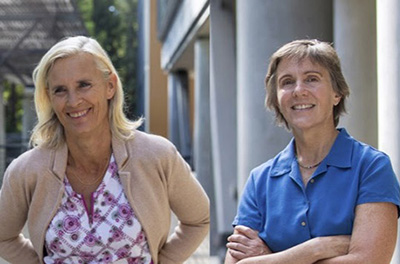Campus News
UCSC wins funding for new programs to support underrepresented doctoral students
Grants from the UC Hispanic Serving Institutions Doctoral Diversity Initiative will prepare students for faculty careers in biomedical sciences and Latin American and Latino Studies.


UC Santa Cruz has received two competitive grant awards from the UC-Hispanic Serving Institutions Doctoral Diversity Initiative (UC-HSI DDI) to fund programs that expand pathways to faculty careers for underrepresented minorities.
The new programs—“Preparing for Faculty Careers in the Biomedical Field,” based in UCSC’s Institute for the Biology of Stem Cells (IBSC), and the “LALS Future Faculty Program,” based in the Department of Latin American and Latino Studies (LALS)—are intended to enhance faculty diversity and promote equity and inclusion in higher education.
The IBSC program will complement two other recently funded IBSC programs that focus on supporting underrepresented minorities at the undergraduate and postdoctoral levels. The addition of a program focused on graduate students enables a complete and cohesive career development pipeline for minority students in the biomedical sciences.
“It fills a gap. We’re very excited to have these three complementary programs at different levels of the pipeline,” said Camilla Forsberg, professor of biomolecular engineering and co-director of the IBSC.
Forsberg and IBSC co-director Lindsay Hinck, professor of molecular, cell and developmental biology, oversee the programs together with IBSC Program Director Catharina Casper-Lindley. Yuliana Ortega, director of UCSC’s STEM Diversity Programs, and Zia Isola, director of the Genomics Institute Office of Diversity Programs, will advise them on program details.
The new program has several components designed to promote recruitment to and retention in UCSC doctoral programs in biomedical sciences. Recruitment efforts will focus on four California State Universities in central California (San José, Monterey Bay, East Bay, and San Francisco), all Hispanic Serving Institutions (HSIs). Current UCSC graduate students will talk to students in biology classes about their experiences and paths to graduate school, and CSU students will also be invited to visit UCSC to learn about the campus and its graduate programs.
Forsberg emphasized that graduate students who participate in outreach and other aspects of the program will receive funding and support so that it is not an additional burden. “A lot of our students are active in trying to create a better environment and increasing diversity, and we want to capture their passion and reward them for their efforts, because it’s valuable for everyone,” she said.
The program aims to strengthen support systems for underrepresented minority graduate students, providing funding to attend national meetings and also reaching out to their families. According to Hinck, family support can be crucial for first-generation students pursuing a Ph.D. and working toward a faculty position in academia.
“We want to tell their families this isn’t an impossible goal and explain the benefits of persevering,” she said.
The IBSC will pilot a new “Family science weekend” and evaluate its effectiveness and impact on underrepresented Ph.D. students at UCSC. Other program components include increasing access to academic leadership training and activities to build career skills.
Meanwhile, in the Latin American and Latino Studies Department, a new Future Faculty Program will offer doctoral students the chance to participate in an eight-week summer publishing institute and a full-day job market preparation workshop. Professor Jessica Taft envisioned the concept for the program, and Associate Professor Patricia Pinho will now lead its development.
The job market workshop will focus on teaching students how to leverage and articulate their qualifications for a wide range of different academic positions.
“We seek to prepare underrepresented students for the professoriate, but it is also meant to work the other way around, as we hope to better educate the job market about the value of an LALS degree,” Pinho said. “Our doctoral program is unique in that it offers an interdisciplinary and transnational approach to the study of the peoples, cultures, societies, and institutions of the Americas.”
The LALS program’s interdisciplinary approach often yields important research insights by applying methods that challenge Eurocentric notions of knowledge production. But academic journals are often still structured tightly around the bounds of traditional disciplines. This and other barriers to entry across the broader publishing industry can uphold harmful hierarchies of power that limit whose voices are heard.
“The knowledge production of some racial and ethnic groups has been historically marginalized or excluded,” Pinho explained. “Through the promotion of otros saberes—roughly, ‘other ways of knowing’—and supporting a greater number of underrepresented minorities to gain access to publishing, these barriers and the hegemony of Western paradigms can be challenged.”
To help address this issue, the publishing institute portion of the Future Faculty Program will teach students how to successfully navigate the review and publication process at academic journals. Participants will also have a chance to improve their writing skills. Pinho says she hopes this will ultimately enable students to reach a broader audience with their insights.
During both the publishing institute and the job market preparation workshop, the Future Faculty program will bring in faculty members from partner HSIs across California to foster a culture of collaboration among and between faculty and students. This will provide professional networking opportunities and other benefits that run much deeper.
“While collaboration is important in any setting, it is even more important for groups that have been historically underrepresented, because it builds community and provides positive role models,” Pinho said. “And this, in turn, contributes to boosting self-confidence and demystifying academia.”
Launched in fall 2019, the UC-HSI Doctoral Diversity Initiative is part of UC’s strategic effort to enhance its faculty diversity by expanding pathways to the professoriate.